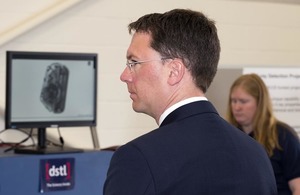DfT Minister and CSA see first-hand the science keeping people safe in the UK
The Defence Science and Technology Laboratory showcases its world-leading research carried out for the Department for Transport.

Aviation Minister Robert Courts viewing security scanning equipment at Dstl
The Undersecretary of State for the Department for Transport (DfT), Robert Courts MP and DfT’s newly appointed Chief Scientific Adviser (CSA) Professor Sarah Sharples have made their first visit to the Defence Science and Technology Laboratory (Dstl). Gareth Davies, the Director General for Aviation, Maritime and International Security also joined the visit.
The trio were shown detailed demonstrations and presentations showcasing the innovative Science and Technology (S&T) that Dstl undertakes in areas that directly support DfT. Dstl experts highlighted the impact of their work and the importance it has on supporting policy decisions that are made in the transport security sector.
Aviation Minister Robert Courts said:
Dstl is a national asset, and I had the privilege of seeing first-hand the world-leading research and development work they are doing with the Department for Transport to help keep our transport network safe and secure.
Demonstrations included an explosive display which was aimed to show the difference between military grade and home-made explosives, how science is helping to improve airport security and how Dstl expertise helps to develop training aids for explosive sniffer dogs.
DfT’s CSA Professor Sarah Sharples, said:
One of the things that we’ve really learned today is how important it is to not just think about the threats and the challenges we’re facing now, but also what we’re going to be facing in the future, so we can be really well prepared. And that’s everything from thinking about how to prevent difficult events from happening, but also about if those events do happen, how we can make sure that our transport system is resilient and able to respond and recover as quickly as possible.
The visit also highlighted the vital work Dstl does in bringing terrorists to justice, with careful evidence based thinking and thorough testing to gather evidence that holds people who commit atrocities to account.
Dstl’s Interim Chief Executive, Doug Umbers said:
Though we’ve been delivering our science to DfT for a number of decades now, this visit was a great opportunity to show DfT first-hand how much work goes into the work we deliver, but also to be able to show physically some of the key areas of work and how the science and research makes an impact.